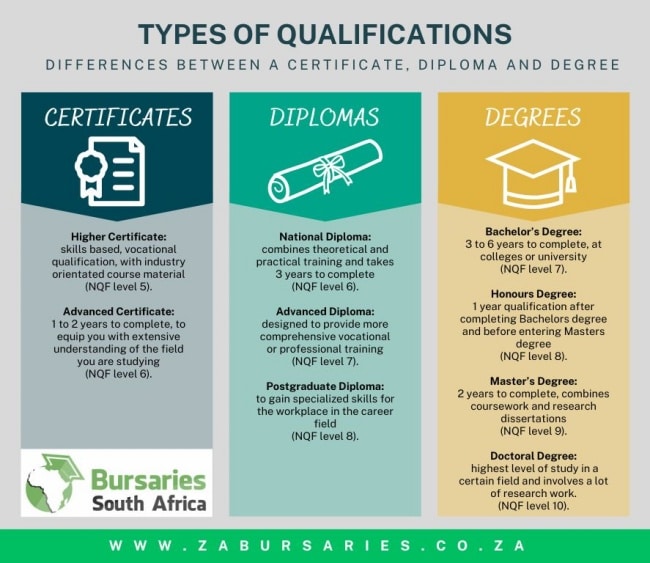Types of Qualifications – Certificates, Diplomas and Degrees
Deciding to further your studies is a great decision but you may be confused about the qualifications available to you. Knowing the differences between a degree, certificate and a diploma can be tricky – after reading this post, you’ll know which is best for you and your study needs.
Each qualification completed has a specific NQF level – read about the NQF levels here.
Differences between a Certificate, Diploma and Degree
CERTIFICATES
Certificates and diplomas are quite similar. They both take a shorter time to complete. However, you can finish certificate courses much faster than a diploma course. Certificates are focused on industry-specific skills. Employers will therefore often send staff to complete certificate courses. This allows them to gain updated knowledge on how to do their jobs.
-
Higher Certificate:
Anyone who has obtained their national senior certificate and satisfies the prerequisites may enrol in a higher certificate course. A student who has earned their higher certificate can apply for an advanced certificate or a diploma course. This qualification may take 2 to 3 years to complete.
A Higher Certificate is a skills based, vocational qualification which means that focus is placed on how skills are applied. Students choose a specific field of work and they will then focus on achieving a set of skills required in that field.
The course material is usually industry orientated. This qualification will also allow you to enrol for an even higher qualification such as an advanced certificate or diploma course, which is in the same or related field of study.
-
Advanced Certificate:
This qualification may take 1 to 2 years to complete. The courses within this qualification are meant to equip you with extensive understanding of the field you are studying. This level of certification is specialised which can improve a student’s job opportunities.
DIPLOMAS
A diploma takes longer than a certificate but is shorter than a degree. Diploma courses usually last between one to three years. However, if you decide to study part-time, it can take just as long as studying a full-time degree.
Diplomas may focus on one subject and often have a practical component. So by the time you graduate, you’ll not only have a qualification, but work experience to go along with it. It can also be much cheaper to study than a degree.
-
National Diploma:
A National Diploma that combines both theoretical and practical training takes three years to complete and is offered by a University of Technology. After obtaining a National Diploma, students may enrol for a Bachelor of Technology degree that takes a year to complete.
These three-year programs combine classroom instruction with hands-on experience. These courses are comparable to those offered for degrees, although the emphasis on internships and real-world experience is stronger for diplomas. You should be able to enrol in a diploma program with a matric exemption or an equivalent. This qualification may take 3 to 4 years to complete. Programmes in this qualification equips students with the needed practical skills in their chosen industry. Students acquire technical skills needed in a specific area in these courses.
There is a National Diploma and a National N Diploma and the difference is that the National N Diploma is obtained after a student successfully completes N4, N5 and N6 qualifications together with 18 months of practical work.
-
Advanced Diploma:
An advanced diploma is a type of qualification designed to provide students with more comprehensive vocational or professional training.
If you do not have a bachelor’s degree yet, an advanced diploma can be used to gain admittance into a bachelor’s degree program.
On the other hand, if you already have a bachelor’s degree and are looking to pursue more specialised careers, an advanced diploma can provide you with the qualification you need to gain admittance into a postgraduate diploma program or find employment as a specialist in your chosen field.
This qualification is obtained in preparation for professional work. It can be taken by a graduate of a bachelor’s degree in order to study a field that is related to their previous level of study.
This qualification can increase the marketability or attractiveness to potential employers of a graduate.
-
Postgraduate Diploma:
This qualification is usually completed after a bachelor’s program and can be helpful for students who may need specialized skills for the workplace in the career field they have chosen.
DEGREES
A degree has a much longer study period and is usually studied through a university. There are various levels. The first level is a Bachelor’s degree. This is what is known as an undergraduate programme and can last a minimum of three years.
After successfully completing your undergraduate programme, you can move on to optional postgraduate studies. This is where you’ll do an Honours degree first, then a Master’s and finally a Doctorate (or PhD). These degrees are more research-focused and will require you to write a thesis or dissertation.
-
Bachelor’s Degree:
What is a Level 7 qualification in South Africa? An undergraduate degree, known as a bachelor’s, is provided by colleges and universities to students who have to complete a three- to six-year period of study, depending on the institution and academic discipline. The Bachelor of Arts (BA) and the Bachelor of Science are the two most popular bachelor’s programmes.
This qualification consists of long-term learning programmes which may take 3 to 5 years to complete. It enables graduates to demonstrate knowledge and skills required for opportunities in the job market, further education and training, postgraduate studies, or expert practice in a wide range of career fields.
Students progress from this degree to master’s and doctoral programs within the same course.
In contrast to diplomas and certificates, degrees are internationally recognized. This makes it possible for graduates to work in other nations, and they are more theoretical than diplomas and certificates. In SA, these programmes can require a matric exemption with additional criteria to enter.
-
Honours Degree:
What comes after a degree? The term “honours degree” refers to a type of undergraduate bachelor’s degree that contains a greater volume of content or a better standard of study, in contrast to an ordinary bachelor’s. Students with a three-year degree may apply for an honours program, which is a one-year requirement to apply for a Master’s. The honours typically focus on one area of study, e.g., Mathematics or English. Admission to the honours is frequently highly competitive.
This degree follows an undergraduate bachelor’s degree and it is the qualification students need if they aim to specialise in their chosen career field. This degree provides students with a deeper understanding of their field and helps students to prepare for research and postgraduate studies.
-
Master’s Degree:
A master’s degree is an academic degree after completing a program of study that demonstrates mastery or a thorough overview of a particular field of study or area of professional practice. It is one of the highest qualifications. The completion of bachelor’s-level coursework, either as a distinct or as a component of an integrated course, is typically necessary for admission to graduate school.
This qualification usually takes two years to complete. It involves a combination of coursework and research dissertations. Students usually engage in advanced research and independent study.
-
Doctoral Degree:
What comes after a master’s degree? A doctorate is an academic certificate awarded by universities and other educational institutions. You need a current Bachelor’s certificate and, in most cases, a master’s in a relevant field to apply for a PhD in South Africa. In rare instances, a candidate without a master’s may be approved. This degree is the highest in the levels of degrees and typically takes at least two years of full-time study. Only individuals who conduct cutting-edge academic research can earn a PhD. To acquire this title, doctoral students must submit a thesis that merits publication.
This qualifications is usually called a PhD and can take 2 to 3 years to complete. This qualification indicates that a student has achieved the highest level of study in a certain field and involves a lot of research work.
Students are required to write a thesis on a particular topic in their chosen field under the guidance of a supervisor.
Are you following us on social media? We post our latest bursary opportunities and reminders of bursaries closing soon on Facebook, Twitter and Instagram.




